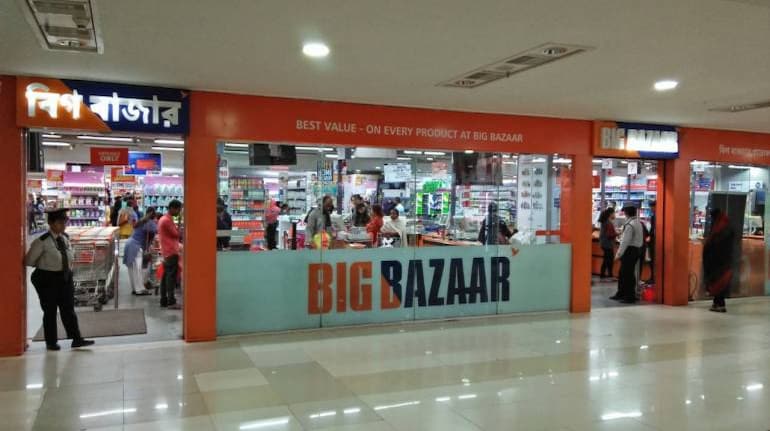



The Mumbai-bench of the National Company Law Tribunal (NCLT) admitted on June 20 a petition by a consortium of lenders led by Bank of India to initiate insolvency proceedings against debt-laden Future Retail.
The NCLT’s order came more than three months after Bank of India filed the application for insolvency. Under the law, the petition should have been admitted within 14 days of filing the application.
The NCLT appointed Vijaykumar V Iyer of Deloitte as the interim resolution professional who will oversee the resolution process of Future Retail.
What is the case?
In 2019, Amazon invested $200 million for a 49 percent stake in Future Coupons, by virtue of which the US company got a 7.3 percent foothold in Future Retail. Not long after this deal, Future Group was deep in debt due to its massive expansion plans and was unable to pay back bank loans.
In 2020, Future Group decided to sell its retail, wholesale, warehousing, and logistics businesses to billionaire Mukesh Ambani’s Reliance Industries in a deal worth $3.4 billion. Amazon tried to block the Reliance deal and obtained a freeze order from the Singapore arbitration court. The dispute gradually snowballed into a slew of cases across multiple Indian courts.
Even as a final order in the case was pending, Reliance bailed out Future Retail by transferring leases of some stores to itself and subletting them to the group to operate. Amazon was not in favour of this.
Banks, on the other hand, categorised Future Retail’s account as a non-performing asset. Bank of India filed insolvency proceedings against Future Retail on April 14 for non-payment of dues.
The tables turned when Reliance said on April 23 the $3.4 billion deal to take over the assets of Future Retail could not be implemented because the company’s secured creditors, including banks, had “voted against the scheme.”
How much does Future Retail owe banks?
Future Retail owed banks Rs 5,322.32 crore as of March 31, according to Bank of India’s petition in the NCLT.

Lenders to the company include Union Bank of India, State Bank of India, Bank of Baroda, and IDBI Bank. Most of these banks have fully provided for their loans to the company, as mandated by the Reserve Bank of India.
What does the NCLT order mean for banks?
With the NCLT order, banks can now formally initiate insolvency proceedings against Future Retail. Lenders can form the committee of creditors (CoC) and drive the resolution process along with the resolution professional. The board of the company will be dissolved and the lenders will become the decision makers regarding the future course of action. Creditors can file their claims, call for bids from potential applicants, consider and assess resolution plans, if any, and can even opt for liquidation as the last resort.
“It (NCLT order) is a breather for banks. The dispute was ongoing for a long time and bankers were even mulling resolving the stress from this account via the National Asset Reconstruction Company,” said an executive with a state-run bank that is a lender to Future Retail.
If all goes well, the banks can hope to recover the amount they advanced to Future Retail and forgo the least amount during the resolution process of the stressed borrower.
“Banks will only benefit if the resolution works, and if Reliance still has an interest in the deal, it is likely that banks will benefit from it,” said Sonam Chandwani, managing partner at KS Legal, a law firm. “The question is how much of a haircut banks will take if Reliance takes over.”
Haircut is a term in banking that refers to the amount that banks need to forgo on their original loan to a stressed borrower.
Can Amazon challenge the NCLT order?
Yes. Amazon can move the National Company Law Appellate Tribunal (NCLAT) challenging the NCLT order. According to people aware of the matter, Amazon is waiting for a written order from the NCLT on this matter to decide its course of action.
“Amazon may challenge this order claiming to be an aggrieved person by the order passed by the NCLT,” said Sandeep Bajaj, managing partner at PSL Advocates & Solicitors. “Amazon may challenge the order dismissing their intervention application also.”
If Amazon’s appeal in NCLAT is admitted, legal complications may follow and the process of recovery and resolution for banks could get delayed.
What do experts say?
According to legal experts, the resolution appears to be nearly impossible without the sale of Future Group’s assets. The NCLAT is unlikely to admit such an intervention and go against the order of the NCLT.
Any appeal against the NCLT order will require the stakeholder to establish how its interests are prejudiced by the CIRP proceedings, said Ashish Pahariya, a partner at DSK Legal. “This may be a tough sale in NCLAT.”
KS Legal’s Chandwani said Amazon’s “array of attempts” to acquire a significant stake in Future Retail is “rather perplexing, especially when the odds are stacked against Amazon in almost every way.”
Amazon does not appear to be backing down from this battle, she added.
Discover the latest Business News, Sensex, and Nifty updates. Obtain Personal Finance insights, tax queries, and expert opinions on Moneycontrol or download the Moneycontrol App to stay updated!
Find the best of Al News in one place, specially curated for you every weekend.
Stay on top of the latest tech trends and biggest startup news.